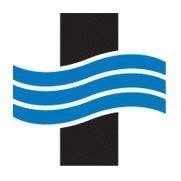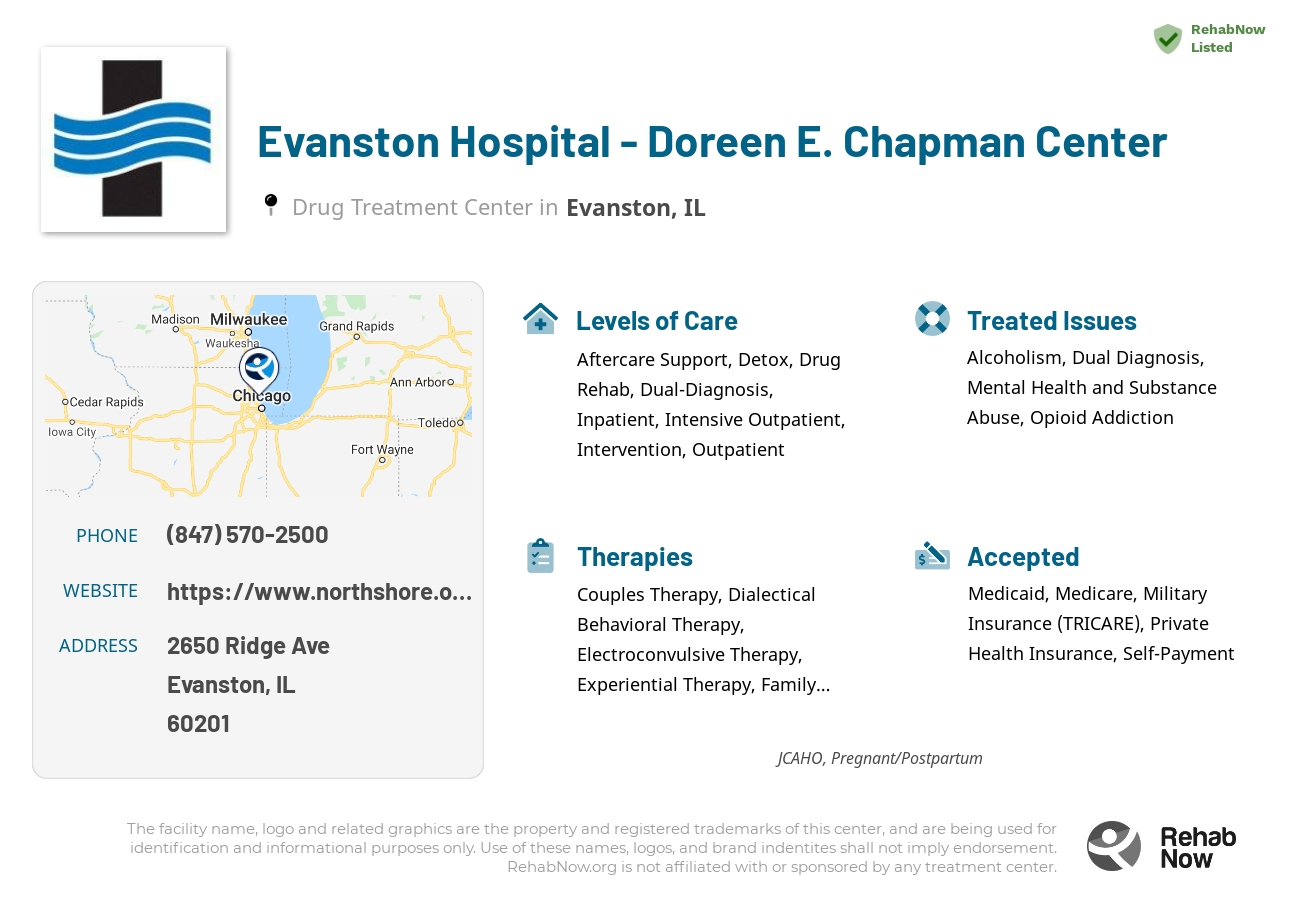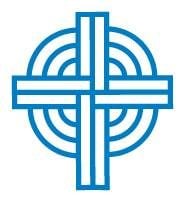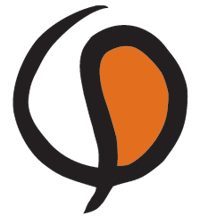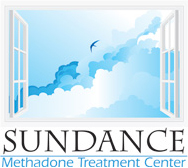Evanston Hospital - Doreen E. Chapman Center
Drug Rehab Center in Evanston, Illinois
Evanston Hospital - Doreen E. Chapman Center in Evanston, Illinois is an addiction treatment facility offering various levels of care and specialized treatment for alcoholism, opioid addiction, dual diagnosis, drug addiction, and substance abuse.
About This Evanston, IL Facility
Evanston Hospital - Doreen E. Chapman Center in Evanston, Illinois, is a distinguished facility focusing on comprehensive treatment for substance use disorder, including services for dual diagnosis. With a 21-bed capacity, the center stands out for its partial hospitalization, intensive outpatient, and unique family programming, all within the renowned NorthShore University HealthSystem.
Accredited by the Joint Commission on Accreditation of Healthcare Organizations (JCAHO), the Chapman Center is recognized for its dedicated approach to addiction treatment. Their offerings span from medication-assisted treatment combining FDA-approved medications and mental health support, to specialized programs that address addiction's impact on the family unit, underlining their commitment to holistic care.
• Partial Hospitalization Program (PHP) offers a robust day program conducive to recovery for those not requiring 24-hour monitoring.
• Intensive Outpatient Program (IOP) provides flexible yet comprehensive care, meeting 9-15 hours per week, perfect for those stepping down from PHP.
• Family Programming addresses the complexities of addiction's impact on family dynamics and promotes healing through knowledge and therapy.
The Chapman Center treats a variety of issues, including alcoholism, opioid addiction, and dual diagnoses, employing effective treatment methods across different levels of care. Their personalized treatment plans are supported by psychiatric services, counseling, and life skill development, ensuring a supportive path to recovery for every individual.
Genders
Ages
Modality
Additional
Accreditations

JCAHO
Conditions and Issues Treated
Addiction to prescription opioid painkillers like oxycodone and hydrocodone, and illicit opioids such as heroin, leads to potentially life-threatening withdrawal symptoms when discontinued. Opioid addiction treatment typically involves an inpatient stay at facilities like Evanston Hospital - Doreen E. Chapman Center to make sure they get through withdrawal safely. Treatment also includes comprehensive mental health counseling.
Mental illness includes conditions such as anxiety, depression, schizophrenia, bipolar disorder. It can also happen that mental illness causes drug addiction and vice versa. Evanston Hospital - Doreen E. Chapman Center in Illinois knows it is vital to diagnose dual diagnosis or co-occurring disorder.
Levels of Care Offered
This center offers a variety of custom treatment tailored to individual recovery. Currently available are Aftercare Support, Detox, Drug Rehab, Dual-Diagnosis, Inpatient, Intensive Outpatient, Intervention, Outpatient, with additional therapies available as listed below.
One of the first things an addict should do when entering treatment is to abstain from using illicit drugs completely. Depending on the length of time that the person has been using, the addict may have to go through alcohol or drug withdrawal. Fortunately, detox doesn’t have to be done alone, and withdrawal symptoms can be managed medically in an inpatient or outpatient setting. While detox may be uncomfortable, it is not life-threatening. Detoxification allows the addict to rid the body of all traces of drugs or alcohol and gives the addict a clean slate for their recovery.
Inpatient programs are intensive regimes that require individuals suffering from serious addictions to admit themselves into a controlled environment. Inpatient programs in Illinois generally span over 28 days to six months. The first step in an inpatient program is medically assisted detox. Doctors and addiction specialists at Evanston Hospital - Doreen E. Chapman Center monitor the individual’s vital signs as the drugs leave their system. Some inpatient rehab programs also provide counseling for family members to provide encouragement and emotional support. In inpatient programs, patients have access to 24-hour medical supervision.
Daily trips to the hospital that provides the treatment include intensive outpatient services (IOP). IOP in Illinois is appropriate for patients in residential recovery facilities that have been diagnosed with addiction. Patients return to their everyday lives gradually, increasing the likeliness of success in treatment.
To assist with alcohol or opioid abuse, or a co-occurring condition, Evanston Hospital - Doreen E. Chapman Center offers an outpatient treatment program. For their rehabilitation and other services, the Illinois patient will go to the treatment center, yet return home every night. After most of the program is completed, the level of mandatory participation reduces.
Treatment is just a first step in sustaining sobriety. After rehabilitation, counseling for aftercare helps the person adapt to a life without drugs. A sober living facility in Evanston, job therapy, or educational assistance may be included in this service, managed by Evanston Hospital - Doreen E. Chapman Center. This is when a preventive strategy for relapse starts to take shape.
Evanston Hospital - Doreen E. Chapman Center‘s Therapies & Programs
In addiction recovery at Evanston Hospital - Doreen E. Chapman Center, therapy plays a significant role. This helps patients get to the root of their addiction and discover how the problems that contributed to their use can be handled better. Therapy can be performed in a group and one on one settings. The patient interacts with the therapist in a one-on-one atmosphere during individual therapy. This encourages them to reflect on the underlying addiction problems and develop ways to avoid potential future abuse.
Recovering from addiction involves recovering relationships as well. One of the most common areas of stress and damage during addiction is in intimate relationships. Couples therapy at Evanston Hospital - Doreen E. Chapman Center can rebuild trust and joy that may have been damaged. Addiction involves everyone in the family, not only the addict.
Family roles can change in damaging ways that may require professional help to rebalance. Successful intimate relationships can decrease the chances for relapse by ensuring a healthy environment after rehab in Evanston, IL.
Addiction and alcoholism affect the entire family. For this reason, family therapy is vital to a person’s recovery from addiction. In contrast to couples counseling, family therapy at Evanston Hospital - Doreen E. Chapman Center may include siblings, children, parents, and other significant people in the recovering person’s life. Family support is one of the most important pillars of recovery.
Many people turn to drugs and alcohol as a way of processing trauma that has affected them in the past. Trauma can include abuse, neglect, the loss of a loved one and other unpleasant incidents. Trauma therapy at Evanston Hospital - Doreen E. Chapman Center helps patients process trauma. It gives them the tools to deal with it in a healthier manner.
Dialectical behavioral therapy (DBT) is a type of Cognitive Behavioral Therapy that focuses on eliminating specific negative thoughts such as suicidal thoughts that can potentially lead to an individual inflicting self-harm. It is useful in the treatment of patients exhibiting uncontrollable emotions, intense mood swings, and borderline personality disorders.
The term “Dialectic” means the integration of opposites. In the substance abuse context, DBT refers to accepting the patient’s addiction and working to change their thoughts and behavior. It improves life skills such as controlling the intense emotions without reacting impulsively, resolving the interpersonal conflicts effectively, and promoting awareness about self and others.
Cognitive Behavioral Therapy (CBT) examines the relationship between a patient’s thoughts, feelings and behaviors. Evanston Hospital - Doreen E. Chapman Center aims to establish a healthy response to thoughts and feelings as an alternative to turning to drugs and alcohol. It also promotes healthy communication between addicts and those around them. It is and effective therapy for people suffering with all types of addictions.
It’s no surprise that diet is a crucial player in one’s well-being. What an individual puts into his or her body becomes the fuel that drives the mental and physical faculties to perform accordingly. Therefore, nutrition therapy, also known as medical nutrition therapy (MNT), guarantees that an individual is providing his or her mind and body with proper nourishment.
The right diet can improve a person’s general outlook, sleep habits, and thought processing skills. MNT also lowers the occurrence of chronic diseases such as adult-onset diabetes. Dieticians at Evanston Hospital - Doreen E. Chapman Center in Evanston, Illinois believe that nutrition therapy is the key to making significant lifestyle changes, especially when it comes to personal care.Nicotine Replacement Therapy (NRTC) used products like skin patches and gum to deliver nicotine into the bloodstream of people trying to quit smoking. This helps break the habits associated with smoking. The very low doses of nicotine managed by Evanston Hospital - Doreen E. Chapman Center prevent cravings while helping people make a gradual transition to complete smoking cessation.
Patient Experience
Experiential Therapy at Evanston Hospital - Doreen E. Chapman Center
Experential therapy is a unique type of therapy that deals with the subconscious mind. This treatment available at Evanston Hospital - Doreen E. Chapman Center in Evanston, IL encourages individuals to work out their issues with their inner self through synchronous experiences.
This non-traditional treatment method makes use of the physique and encourages people to take part in various physical and emotional activities, movements, and practices. Some of the most common examples of experiential therapy are equine therapy, music therapy, adventure therapy, and role playing. Through these various methods, an individual is believed to heal from trauma, negative emotions, and hurtful memories faster. Moreover, experiential therapy is known to have enduring results which can be beneficial to sufferers.
Payment Options Accepted
For specific insurance or payment methods please contact us.
Is your insurance accepted?
Ask an expert, call (888) 674-0062
NorthShore University HealthSystem Associated Centers
Discover treatment facilities under the same provider.
- NorthShore Deerfield Behavioral Health Center in Lake Forest, IL
- Glenbrook Hospital in Glenview, IL
- Highland Park Hospital - Behavioral Health in Highland Park, IL
Learn More About NorthShore University HealthSystem Centers
Additional Details
Specifics, location, and helpful extra information.
Evanston, Illinois 60201 Phone Number(847) 570-2500 Meta DetailsUpdated April 15, 2024
Staff Verified
Patient Reviews
There are no reviews yet. Be the first one to write one.
Evanston, Illinois Addiction Information
In 2016, more than 2,350 Illinoisans died from drug overdoses. More than 5,500 deaths annually occur in Illinois due to the abuse of alcohol and other drugs. 7.17% of Illinois residents reported using illicit drugs in the past month (2018). Substance abuse costs the state approximately $3.5 billion every year.
Evanston, IL is a community that is struggling with addiction and abuse problems. 54% of high school students in Evanston have tried alcohol. There were over 2,000 admissions to drug and alcohol treatment facilities annually. The number of deaths from drug overdoses in the area has quadrupled since 1998. Outpatient treatment typically lasts for 12 weeks. This type of treatment is best for those with a mild to moderate addiction.
Treatment in Nearby Cities
- Lake Villa, IL (31.4 mi.)
- Skokie, IL (3.7 mi.)
- Olney, IL (231.6 mi.)
- Hinsdale, IL (22.5 mi.)
- Oak Forest, IL (32.2 mi.)
Centers near Evanston Hospital - Doreen E. Chapman Center
The facility name, logo and brand are the property and registered trademarks of Evanston Hospital - Doreen E. Chapman Center, and are being used for identification and informational purposes only. Use of these names, logos and brands shall not imply endorsement. RehabNow.org is not affiliated with or sponsored by Evanston Hospital - Doreen E. Chapman Center.
